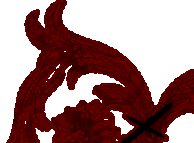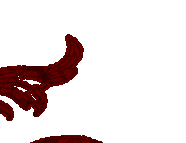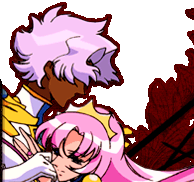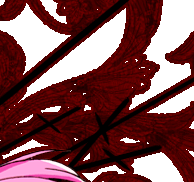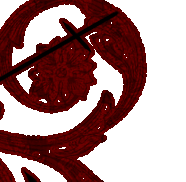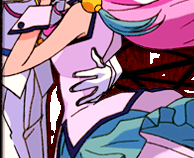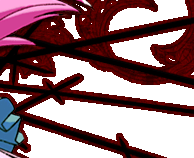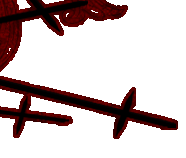
This analysis
was donated by Danielle. 
At first glance, one may view the anime Revolutionary Girl Utena: the Movie as an average
heroic tale. Others argue that Utena is just another "magical girl." The magical girl formula is
simple. The protagonist is typically a young woman who is middle school/high school age endowed
with some sort of superhuman ability or power. The power usually does not belong to the woman,
but rather it is an external force. The power that the girl receives usually manifests in some sort of
phallic instrument. Swords or scepters are common examples of phallic objects. Circumstances often
force the protagonist to fight against evil for some universal cause. Anime is different from
American cartoons, as they tend to be oriented toward an older audience. As a result, the story lines
are often more complex compared to their American counterparts.
Utena's journey can be viewed as coming of age story. Stories of transition are common in
the anime world. This particular anime has much more to offer; it is surreal and symbolic. The
scenery is very archetypal in nature. It speaks to something deeper than coming of age, unconscious
manifestations are also present. Then of course, there are the more serious issues teens deal with, sex,
violence, love and much more. The goal of this research is to examine the film from a Jungian and
archetypal perspective. In addition, the idea of feminism and cultural implications will also be
examined. The magical girl genre is by far one of the more popular genres of anime. I think this
popularity stems from the repression of the feminine in western culture. Lack of attention to the
feminine energy has skewed the view of society. According to Hollis, "when we are off track,
psyche protests."
 Fairytale Origins Before delving into analysis, let us start with a brief background on Utena. As a child the
death of her parents pushed her into a deep depression. One day a prince on a white horse came and
took away her sadness. She was so impressed by his nobility she decided that she wanted to become
a prince herself. The film starts with church bells ringing
and the audience gets a view of the mechanistic Ohtori academy. The viewer gets a glance at a
teenage Utena, dressed in a boy uniform. As she walks through the school, she spots a young man
with red hair named Touga in the distance. She follows him to a secluded area of the school where it
is raining, and suddenly he appears. This interaction is important for several reasons. We soon learn
Touga was a childhood friend and this moment is their reunion. Or rather, is it a confrontation?
 Struggles with the Animus The ego (Utena) has not seen Touga (her animus) for years. His sudden manifestation is
indicative of the struggle she is facing. Her hostility toward him is understandable. The ego is
rather timid and does not like psychic disturbances. Without this aspect of her personality present
any longer, this facilitated the development of her "princely" persona to compensate. Johnson
defines persona as "our psychological clothing [that] mediates between our true selves and our
environment." The persona is not who we are, it is who we appear to be to others. Utena appears
to be a prince, but she has failed to integrate the animus. According to Jung, the animus is the
inner masculine of a woman. "Woman is compensated by a masculine element and therefore her
unconscious has, so to speak, a masculine imprint."
There is a dilemma when it comes to the persona. In order to function in society, one must
construct persona's that are appropriate for different situations because society has its vision of what
is considered to be ideal. In order to avoid sacrificing all of one's individuality entirely "the
construction of an artificial personality becomes an unavoidable necessity." Constructing an
acceptable persona involves "a formidable concession to the external world." As a consequence this
"drives the ego straight into identification with the persona." After this occurs, a person begins to
believe that their persona is their identity (ego) and this can further stifle personality development.
As a result, a person will not be able to achieve individuation, the process of decentering the ego to
realize the true Self. Jung defines individuation as "a process of psychological differentiation,
having for its goal the development of the individual personality." Individuation is never really
complete. An individuated person knows who they are down to the core of their being. In
addition, they are in touch with their deepest Self. The Self according to Jung is "not only the
centre, but also the whole circumference which embraces both conscious and unconscious; it is
the centre of this totality, just as the ego is the centre of consciousness".
Moving back toward Utena and Touga, this scene has a bit of feminism imbedded in the
content. Like so many young women today, Utena is fighting against gender constraints, which may
shed light on why she seeks to become the prince rather than the princess. As a result, she has taken
on the persona of the strong capable prince. Utena faces another dilemma; the princely persona is
socially acceptable for a man not necessarily for a woman. The underlying issue here seems to be
why a girl cannot be a prince in this world. Gender has nothing to do with archetypal energy that
somebody is embodying. One can conclude that Utena realizes this, and it makes others at Ohtori
academy uncomfortable. Utena also appears to be struggling with her desire of being a prince while
still maintaining her femininity. The struggle of the feminine and the animus is nothing new. Ideally,
embracing the animus should not mean losing femininity. But apparently, she is finding it difficult to
hold onto both. Nevertheless, when certain traits are deemed masculine by society, it seems almost
impossible not to lose some femininity in the process. Utena is transitioning into a woman in a
patriarchal society. Ohtori academy is the embodiment of that patriarchal order. Utena takes matters
into her own hands. Rather than waiting to be saved, she decides she wants to save herself. She is
however still identifying with the image of the prince. Relying on the energy of an image can provide
power. However, if we look at James Hillman's teachings, we can see that power is often restrictive.
As mentioned previously, Utena has repressed her animus. There is one major problem with
repression; it can lead to repression of potentially good traits. Traits that are considered the norm are
affixed to the ego. However, any traits that deviate from the norm or are "less" than the norm end
up in the shadow. Not all the traits that go into the shadow are "bad," it is only when these traits
are disregarded and repressed that they become dark. Behaviors do not simply disappear; they go
into the unconscious and become part of the shadow. These unacceptable behaviors can later arise as
symptoms or neurosis.
One may wonder what is so appealing about being a Prince. The prince is a dominant
archetypal figure prevalent in fairytales, literature, and film who saves the "damsel in distress." The
word prince has Latin origins meaning first or chief, the prince is a privileged individual. For these
reasons, becoming a prince is more appealing to Utena. But it appears she is taking in only the
positive aspects of what it means to be a prince. Privilege involves sacrifice, and in her case she is
sacrificing her sense of Self.
We later find Utena standing in front of some red roses; a lone white flower comes out and
blooms. She comes into this journey both innocent and naïve, white is a fitting color given the
context. The flower comes bearing a gift, her own, rose signet ring. According to the director
Ikuhara, in his audio commentary he explains the rose signet was symbolic of the prince. One could
argue the ring is symbolic of her acceptance of the task of individuation. And in the film the ring
signifies making a contract with "world's end." The "world's end" in this case would be the end of
childhood and transition into adulthood: abandoning everything to become the prince. Shortly after
this scene, she comes to a rose filled dueling arena where she then encounters a girl named Anthy.
After a brief introduction, Utena is thrust into battle after witnessing Anthy's current fiancé being
abusive. The nature of Anthy is then revealed. She is the Rose bride, the key to revolutionize the world.
 Pain is Beauty: Interpretations of the Rose Bride Anthy is representative of many things due to her role as the Rose Bride. Despite her quiet
demeanor, she has a passive aggressive personality. At the same time, she is also very submissive.
She appears to have no free will of her own and her past contains many dark secrets. The prince that
saved Utena as a child is also Anthy's brother the Rose Prince. Anthy sealed him away from the
public when they were younger. And for doing so she was accused of being a witch for taking away
the prince. She had her reasons, whether she was being selfish is a matter of opinion. However, the
prince was ill from saving everyone's daughters. He sacrificed his health for the sake of others. From
her perspective, "it was wrong for him to do all the saving - when clearly, their daughters could have
very well saved themselves." She also felt that he was her prince and had no interest in sharing him
with the public. In reality, Anthy was the one who endowed him with his power, the Rose Prince was
"the lord of the flies." Once the magic wore off the prince reverted to his true form, her projection
withdrew. The prince did not exist, Rather he was an
ideal. The dueling games were then set by Anthy's brother Akio (the true form of the Rose Prince) in
order to regain the power that was lost. Anthy sacrificed herself by becoming a Rose Bride to aid in
her brother's cause. She wanted her prince back.
One could also argue the presence of a character like Anthy can make female viewers
uncomfortable. With good reason, she deliberately became the damsel in distress. She seems to be
representative of many traits that have a shadowy feel to them. She is the marginalized and repressed
woman. She forces viewers to confront their societal standards. Her role is exactly what Utena is
fighting against. She made a choice to take on the role of the Rose Bride. Her presence gives voice to
the struggles faced by women. She perpetuated the image of the Rose Prince, giving strength to the
patriarchal order.
Like Utena, she too struggles with her own identity as she maintains the image of the Rose
Bride. Her ego identifies with the persona, in turn her personality's orientation is skewed. With
Anthy there is a disconnect with the sacred and the mask. According to Hillman, the persona/mask
not only has an individual component but it is also part of collective consciousness. Similar to ego
identification, she begins to identify with the image of the Rose Bride. The identification is so strong
that a loss of identity occurs and she becomes a living vessel for both conscious and unconscious
contents. A shell of her former self, she begins to believe that acceptance of the current society is the
only answer.
Despite her timid appearance, Anthy has access to a great deal of power. Within her body she
houses what is known as "the sword of Dios." The sword is the power that that other characters are
fighting for, back at the duel, Utena fights with her makeshift sword it is clear she is losing the battle.
Anthy saves Utena from losing the battle; suddenly the sword of Dios protrudes from Anthy's chest.
Utena then draws the sword, transforms into a prince and wins the battle. Swords are a common
phallic symbol of strength and destruction. Utena became the possessor of the phallus but only for a
short period of time.
For the student council members the phallus "is the emblem of privilege," and for this reason,
they continue to fight over the Rose Bride. The phallus would not exist without a womb to contain
it. Both the masculine and the feminine are necessary. Anthy ability to house the sword speaks to the
need of integration within the society. So often it is mentioned how men need to get in touch with the
anima. However, the animus is calling to women as well. Anthy's character also addressed how
contradictory the patriarchal society is. The ideal image of the woman being submissive, passive, and
weak is illogical. Her ability to house the sword of Dios is indicative that the feminine is both
necessary and powerful. Aside from forcing viewers to examine their standards, the Rose Bride is an
embodiment of the Shadow. Due to her persona identification, there is a strong archetypal presence
within her. She is giving a voice to the marginalized woman. She reveals that oppression can only
exist when it is accepted.
At the end of the fight, Utena wins and becomes engaged to Anthy. This particular union is
symbolic of the ego being confronted with the Shadow. "I have no need for the Rose Bride!" Utena
exclaims blatantly attempting to avoid confronting the Shadow. Utena faces resistance everywhere
she goes. She fights several duels, all of which she wins. In her final duel, she becomes possessed by
the animus and this leads her to her victory. True transformation has finally begun. At the end of her
final duel, the castle of eternity comes from the sky. The facade of Ohtori academy becomes clear.
This place is not connected to the real world. Where do we see castles? Fairytales. Ohtori academy is
only real to the ones who choose to believe so. The castle itself is symbolic of the current order at the
academy. The ominous structure also demonstrates the strength of the patriarchal order. The castle
also is representative of the unconscious, which will be explored further at a later point in analysis.
 Integration At the end of her final duel, the audience finds Utena running and looking for Anthy. Instead
she finds Touga. She climbs into an elevator and the final confrontation begins. The elevator goes
downward signaling her plunge into the depths. Touga asks Utena if she realizes the significance of
the duels. "There is no prince in the flesh," all of the duels were centered around the image
prince. Then truth is finally revealed, there was no prince in the first place only the image. In
reality, the students are dueling to maintain the image of the prince. Utena finally realizes her
persona identification. And she also realizes the truth of the world around her: they are both are
cultural constructs. When Touga and Utena were children, he actually drowned trying to save
someone else. The split in Utena's personality drowned out Touga, he no longer had a place. Touga
asks her to come with him, but she does not accept. If she went with him, she would not be able to go
to the outside world. The elevator begins to fill with water and Touga swims away into the darkness.
The water symbolically cleanses Utena of her apprehension of assimilating the animus. The
negativity associated with integrating the animus fades. Once the elevator stops descending, and the
doors open, the audience finds Utena at the top of the school. Her descent into the unconscious has
brought her to a higher state of consciousness. She has also accepted the truth of the world around her.
After this scenario Utena meets with Anthy who says that now she is the prince of the
academy. This only remains true if she stays in their world. Anthy attempts to give the sword of Dios
to Utena, but she refuses it and says "let's go to the outside world." Her newly acquired mindset
drove her to seek freedom. She does not need the phallus, she can be the phallus. Shortly after this
realization, Utena is then transformed into a vehicle. Anthy stares in amazement, it turns out she
holds the key. Utena came into Ohtori to be a prince. But at this point it appears she was there to set
Anthy free. The platform they are on descends down into the depths, Utena cannot take Anthy with
her unless she too confronts unconsciousness. Before driving off Anthy sees the real image of her
brother in a short clip. The audience finds out that Akio drugged her and sexually abused her. A far
cry from the heroic prince she thought him to be. Once again, the audience comes in contact with the
idea of choice. Acceptance is what brings on suffering. After confronting the image, Anthy decides
she is ready to remove the mask of the Rose Bride, and become who she really is.
As she drives down the dark highway several obstacles try to stop her. Others are beckoning
her to return to the academy. Finally, the castle makes an appearance. The monolithic structure
literally rides on thousands of wheels. The castle itself in this situation is representative of
consciousness and the patriarchal order. Underneath the surface the true complexity is revealed. The
bottom of the structure is representative of the unconscious. Anthy realizes that the exit is underneath
the structure. If she really wants to be free of her psychic bondage, she will have to face the
unconscious head on. The opportunity to turn back had passed and she decided that she was no
longer going be running. Suddenly, the form of the vehicle changes, it now appears to be shaped like
a phallus to make entry into the structure easier. Anthy and Utena penetrate the structure of the
castle. The ego (Anthy) then realizes that she must give up the identity of the Rose Bride to get
through this fight. The closer she gets to the exit the harder it becomes to maneuver.
She rides through the structure to come out on the other side, but there is still one last
confrontation waiting for her, and that is the Rose Prince/Akio. He beckons her to come back to the
"other world, all you have to do is become a corpse." In short, to maintain the order one must be
dead inside. He also implied that two women were not capable of changing the way things were.
Their roles were to be princesses and nothing more. Finally, Anthy rejects Akio as her prince and
decides to save herself. Anthy and Utena break through the castle, and the structure fades away.
There is a final flashback of the school with scenes of the classrooms. The viewer sees some straw
dolls with nametags on them. Upon closer inspection, it appears the nametags said Utena and Anthy
on them. They not only left the imaginary world behind, they also left their innocence.
Utena goes beyond coming of age. The revolution that characters spoke about did not really
exist. How can one revolutionize a fantasy world? The revolution was waking up from the fantasy
and coming into adulthood. Anime is influential in that it permeates psychic barriers easily with its
imagery. The imagery in turn gives the archetypes the means to communicate with us. Characters
like the Rose Bride encourage viewers to reexamine their standards. Characters like Utena
demonstrate how societal constraints on characteristics are stifling development for both men and women.
 |

